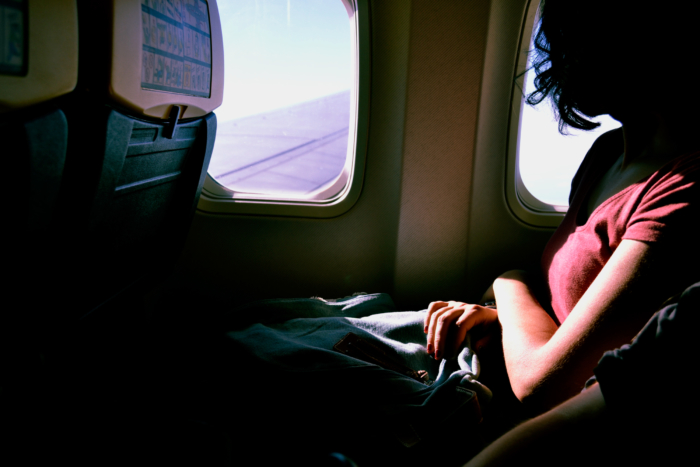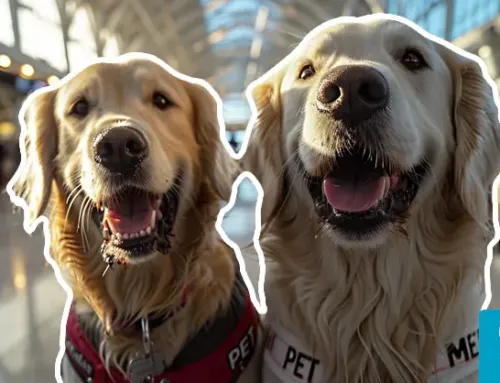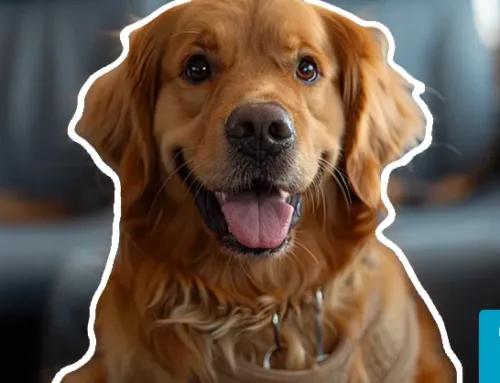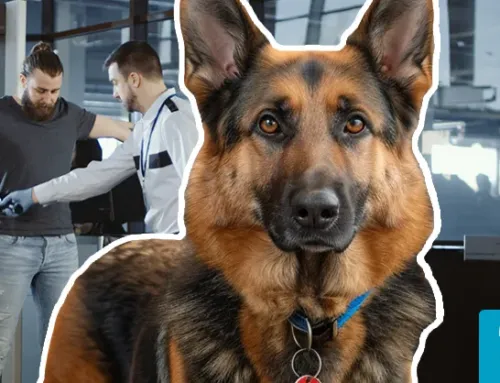You may have seen a dog on a recent flight that wasn’t in a pet carrier and wondered how they were allowed to board. After all, new regulations went into effect in the first quarter of 2021 that effectively allowed airlines to ban emotional support animals from flights.
The canine you saw in the cabin may have been a psychiatric service dog (PSD). Psychiatric service dogs are still protected by the DOT’s air travel regulations and allowed to board flights free of charge. They are also not limited to restrictions applicable to normal pets, so larger dogs are able to board without having to be placed in a kennel.
Many individuals who suffer from emotional or mental disabilities do not exhibit any outwardly visible symptoms. For this reason, it may cause some of the passengers to wonder, why are psychiatric service dogs allowed inside airplane cabins? Aren’t they just “glorified” pets?
The truth is that psychiatric service dogs are just as important to their owners as service dogs are to handlers with physical disabilities. PSDs are so critical to the lives of their owners that they are protected by federal laws. In this article, we’ll explore why PSD owners are given these rights and how they can board aircraft cabins.
Good News! All airlines still accept Psychiatric Service Dogs on all flights.
If you are interested in a Psychiatric Service Dog Letter, we would be happy to connect you with a licensed healthcare provider so they may assist you.
What federal laws protect Psychiatric Service Dogs?
The Air Carrier Access Act (ACAA) is a federal law that protects people with physical or mental disabilities from being discriminated against due to their need for a service dog.
Under the ACAA, if you have a mental or emotional disability, you can travel with your psychiatric service dog in the cabin of the airplane. You also cannot be charged an additional fee for your PSD.
The DOT issues regulations that airlines must follow regarding psychiatric service dogs. Their most recently updated rules went into effect in the first quarter of 2021 and affirmed that psychiatric service dogs must be accommodated on flights without charge.
Psychiatric service dogs are allowed to accompany their owners on flights because they are trained to perform a job that directly assists with the handler’s condition. The tasks they perform allow their owners to travel, work, socialize and go about their everyday lives. PSDs are essential to the lives of their owners and are thus protected by federal disability laws.

What Do You Need to Fly With a PSD?
Although you legally cannot be discriminated against for having to bring your PSD onboard the aircraft, it’s not as simple as just showing up and calling any animal a PSD. Here’s what you will need to comply with the DOT’s regulations:
- You must have a qualifying mental or emotional health disability.
- You must submit the DOT’s Service Animal Air Transportation Form to the airline at least 48 hours before your flight (or at the gate if you book within 48 hours of the flight).
- Your psychiatric service dog must be fully trained to perform tasks relating to your disability (PSDs in training are not yet considered service dogs).
- Your PSD must be under your control at all times.
- Your PSD cannot exhibit aggressive behavior such as growling, lunging, or excessive barking.
How Do You Know Whether You Have a Qualifying Disability?
To have a psychiatric service dog, you must have a qualifying disability for purposes of the ADA and ACAA. A licensed mental health professional can help determine whether you meet the relevant criteria.
A qualifying disability includes mental health conditions like depression, anxiety, PTSD, phobias, and learning disorders that substantially limit a major life activity. A licensed mental health professional can evaluate whether you meet that threshold and issue a PSD letter to you if you meet their standards.
If you need a PSD letter from a licensed professional online, ESA Doctors can help. ESA Doctors will connect you to an actual mental health professional that is licensed for your state. If you qualify, they will give you a signed PSD letter.
Get your PSD Letter in three easy steps.

Things to Keep in Mind When Travelling With a PSD
To help your check-in at the airport go more smoothly, here are some helpful tips:
- Ensure you have notified the airline ahead of time and informed them that you are traveling with a PSD when booking your reservation.
- Make sure you have completed the DOT’s Form and submitted it to the airline before departure.
- If your PSD is unruly, vicious, out of control, or is causing undue distress to other flyers, you can be denied access to the flight.
- Airline staff can require your PSD to be harnessed, leashed, or tethered at all times.
- Airline staff are not permitted to ask about details regarding your health condition or request your PSD demonstrate its trained task.







i agree with most pet owners would gladly change their flight if someone has allergys. we all need to give and take in this life and not feel anyone is more important than the other. that being said…..there are alot of dirty people out there that have more disqusting germs than any shedding dog and dogs are much more loving and faithful than most people.
I have a cat as an emotional support animal. I just want all travelers with allergies to cats to know that I would voluntarily reschedule my flight if someone on my flight had cat allergies. I feel people with pet allergies have the right to fly without threat of allergic reaction to pet dander. For them, allergens can be potentially life-threatening. Airlines could help by notifying passengers that an animal will be in the cabin–and also asking if either the allergic person or the animal owner would be able to change to a different flight. I don’t feel my disability is more important than an allergy that could be considered a medical disability.